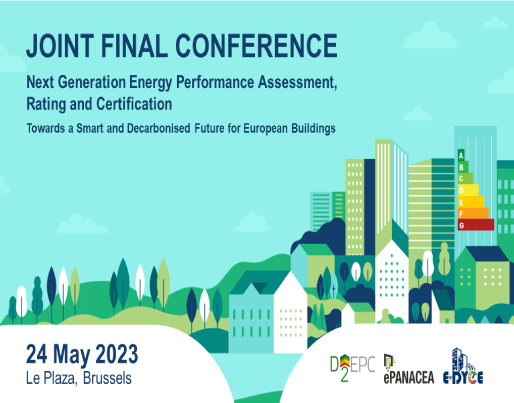Final Conference of D^2EPC, E-DYCE & ePANACEA projects

Final Conference of D^2EPC, E-DYCE & ePANACEA projects
Details of the conference
Hotel Le Plaza, Adolphe Maxlaan 118/126, 1000 Brussels, Belgium
Reaching the end of D^2EPC, E-DYCE & ePANACEA projects, all co-funded by the EU's Horizon 2020 research and innovation programme, a common final conference will be held on 24 May 2023, physically in Brussels (Le Plaza).
The three projects, each unique with its own perspective on the issue of Energy Performance Certificates (EPCs), will meet to discuss “Next Generation Energy Performance Assessment, Rating and Certification: Towards a Smart and Decarbonised Future for European Buildings”. The conference aims to contribute to the dialogue ahead of EPCs interlinked with AI, platforms, data and the BIM-based digital twin concept and it will provide participants the opportunity to discuss about:
- The global context, EU policy context, EPBD Recast, REPower EU etc. regarding EPCs
- The gaps of the existing energy performance certification schemes
- The technology, policy and market insights from the three projects
- Specific results from the three projects
- The opportunities and challenges of dynamic and smart EPCs
Most EU Member States have set up a central or regional EPC register to enhance the energy performance of buildings. The EPCs provide information to consumers on buildings they plan to purchase or rent and include an energy performance rating and recommendations for cost-effective improvements. After 10 years of track record, the current EPCs schemes across the EU do not fully accomplish the following objectives: lack of accuracy, a gap between theoretical and real consumption patterns, absence of proper protocols for inclusion of smart and novel technologies, little convergence across EU schemes, lack of trust in the market and very little user awareness related to energy efficiency. In addition, smartness in buildings, which are easy to cope with changes, are not rewarded when buildings are labeled. Overheating, low comfort, demotivation for renovations can be considered as results of poor decisions taken through EPCs.
The three projects’ objectives are:
- Set the grounds for the NextGen of dynamic EPCs for the operational assessment of buildings energy performance, building upon actual data and the ‘digital twin’ concept to enable enhanced multi-parameter assessment and provide improved AI-driven assessment recommendations (D^2EPC project)
- The natural evolution of the conventional EPC into real time optimisation of building performance and comfort, by capturing the building’s dynamic behavior, and simultaneously providing transparent feedback, through an intuitive interface (E-DYCE project)
- Making use of the most advanced techniques in dynamic and automated simulation modelling, big data analysis and machine learning, inverse modelling or the estimation of potential energy savings and economic viability check (ePANACEA project)